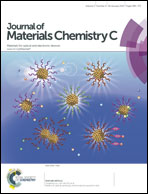Fabrication of highly transparent and conducting PEDOT:PSS films using a formic acid treatment
Abstract
The present work is focused on the development of transparent conductive polymer films and improving their conductivity. The films were produced using a commercially available poly(3,4-ethylenedioxythiophene):poly(styrenesulfonate) (PEDOT:PSS) aqueous dispersion. To deposit the PEDOT:PSS an automated programmable spray system was used. This enabled spraying the PEDOT:PSS onto reasonably large heated substrates creating a smooth homogeneous film. The dimensions and thickness of the film can be controlled and size or area of the film is only limited by spraying system dimensions providing a readily up scalable film deposition technique. The sprayed films were produced on a range of polymer (e.g. PET, polycarbonate and dielectric elastomer 3M VHB) or glass substrates. Varying PEDOT:PSS film thicknesses (corresponding to films of various %T values of <95% to >75%) were deposited and characterised primarily by UV-vis and Raman spectroscopy, Atomic Force Microscopy (AFM) and 4-point resistance measurements. The untreated films showed a relatively poor sheet resistance to transparency ratio as expected. However, treatment of these films using methanol and formic acid resulted in a huge improvement in sheet resistance values in the range of 3–4 orders of magnitude from the untreated films. In addition, the FA treated PEDOT:PSS films showed greater stability and only a slight reduction in their conductivity over 200 h on atmospheric exposure. We believe that the improvement in conductive properties of PEDOT:PSS films and the easily up scalable fabrication by automated spraying opens up a range of potential applications including flexible displays, light emitting diodes, photovoltaic cells, sensors, window defrost systems, photo-chromic windows and sunroofs in cars.


 Please wait while we load your content...
Please wait while we load your content...